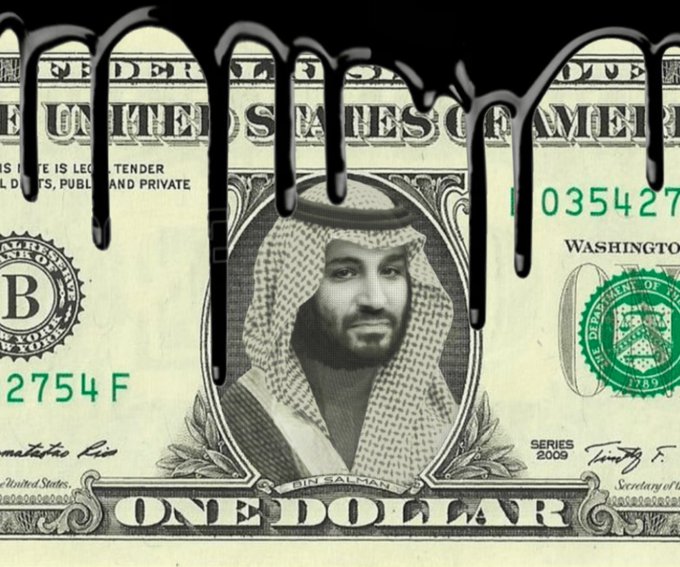The 50-year-old petrodollar agreement between the U.S. and Saudi Arabia was just allowed to expire. The term “petrodollar” refers to the U.S. dollar’s role as the currency used for crude oil transactions on the world market.
It happened several days ago and the news has been silent pic.twitter.com/LPTwKXQPbH
— Dizzy 🇵🇸 (@dizalifornia) June 12, 2024
This arrangement has its roots in the 1970s when the United States and Saudi Arabia struck a deal shortly after the U.S. went off the gold standard that would go on to have far-reaching consequences for the global economy. In the history of global finance, few agreements have wielded as many benefits as the petrodollar pact did for the U.S. economy.
𝗦𝗮𝘂𝗱𝗶 𝗔𝗿𝗮𝗯𝗶𝗮 𝗗𝗶𝘁𝗰𝗵𝗲𝘀 𝗨𝗦 𝗗𝗼𝗹𝗹𝗮𝗿
— Shadow of Ezra (@ShadowofEzra) June 12, 2024
Saudi Arabia will not be renewing the 50-year petrodollar agreement with the United States.
Instead, they will be selling oil in multiple currencies, including the Chinese RMB, Euros, Yen, and Yuan.
This should be… pic.twitter.com/SRRgKHyC3f
The US-Saudi petrodollar pact was formalized after the 1973 oil crisis and provided several advantages to the United States. It stipulated that Saudi Arabia would price its oil exports exclusively in U.S. dollars and invest its surplus oil revenues in U.S. Treasury bonds. In return, the U.S. provided military support and protection to the kingdom. This arrangement was a win-win situation for both; the U.S. gained a stable source of oil and a captive market for its debt, while Saudi Arabia secured its economic and overall security.
This arrangement was beneficial for the U.S. economy in several ways:
- Stable Source of Oil: The pact ensured a steady supply of oil to the U.S., which is crucial for the country’s energy security.
- Market for U.S. Debt: Saudi Arabia’s reinvestment of its oil revenues into U.S. Treasury bonds provided a captive market for U.S. debt, helping to finance U.S. government spending.
- Elevated the Dollar’s Status: By mandating that oil be sold in U.S. dollars, the agreement elevated the dollar’s status as the world’s reserve currency. This allowed the U.S. to borrow at lower interest rates and helped to maintain the dollar’s value.
- Boosted the U.S. Standard of Living: The strength of the dollar, partly due to the petrodollar pact, contributed to a high standard of living in the U.S. This is because a strong dollar makes imports cheaper, increasing purchasing power.
- Mutual Dependence: The pact created mutual dependence between the U.S. and Saudi Arabia, ensuring cooperation and stability in the relationship.
- Global Economic Influence: The petrodollar system extended the dollar’s global dominance by fueling demand for dollar-denominated investments outside the U.S. This helped the U.S. to share political and economic power with the developing countries supplying its energy.
As of June 9th, 2024, Saudi Arabia has decline to renew the 50 year Petrodollar agreement.
— Wall Street Silver (@WallStreetSilv) June 13, 2024
This agreement provided security and weapons to Saudi Arabia in return for Saudi Arabia pricing oil in US Dollars, which helped maintain the US dollar as the world reserve currency.… pic.twitter.com/SASNHr5VfV
The end of the petrodollar relationship could have significant implications for the U.S. economy and its global financial standing.
- Shift in Global Currency: The petrodollar system, which mandated that oil be priced and traded in U.S. dollars, has been a cornerstone of the dollar’s global dominance. The end of this system could lead to a decrease in global demand for the U.S. dollar, potentially weakening its value and influence.
- Impact on U.S. Debt: The petrodollar system also facilitated the recycling of petrodollars into U.S. Treasury bonds, helping to finance U.S. government spending. Without this arrangement, the U.S. might face challenges in managing its debt and could see increased borrowing costs.
- Inflationary Pressure: A decrease in demand for the U.S. dollar could lead to inflationary pressure domestically, as imports would become more expensive. This could impact the purchasing power of U.S. consumers and businesses.
- Economic Realignment: The end of the petrodollar could also lead to a broader economic realignment, as countries and businesses adjust to new currency norms and trade agreements. This could create both challenges and opportunities for U.S. businesses.
- Geopolitical Implications: The petrodollar system was a key element of U.S. geopolitical strategy, providing leverage in international relations. The end of this system could weaken U.S. influence and require a reevaluation of its global strategy.
- Energy Security: The petrodollar agreement was part of a broader relationship with Saudi Arabia that included security guarantees. The end of this agreement could impact U.S. energy security and its strategic interests in the Middle East.
- Financial Market Volatility: The shift away from the petrodollar could lead to increased volatility in financial markets as they adjust to new realities. This could impact investment decisions and the stability of financial institutions.
